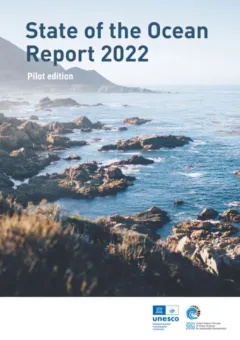
During last week’s UN Ocean Conference, the Intergovernmental Oceanographic Commission of the United Nations Educational, Scientific and Cultural Organization (IOC-UNESCO) launched a pilot “State of the Ocean Report”.
The National Oceanography Centre (NOC) is pleased to have contributed expert knowledge from two authors, Dr Helen Snaith and Pauline Weatherall, and two reviewers, Alan Evans and Dr Angela Hibbert.
Building on examples from IOC-led or joint initiatives, the report is structured around the current Ten Challenges of the UN Decade of Ocean Science for Sustainable Development, 2021–2030.
The pilot State of the Ocean Report is a forerunner of what is intended to become a brief, accessible, one-stop overview of IOC, and possibly other UN agency, activities on the current state of the ocean to monitor progress towards global goals.
Its aim is to succinctly compile current knowledge on the state of the ocean, from pollution to biodiversity, bringing key information to policy-makers and ocean managers, required for making informed decisions in ocean protection and sustainable planning.
“The Report will help to efficiently monitor the progress of the UN Ocean Decade, and, in time, can become an eagerly anticipated worldwide publication that will contribute significantly to mobilizing global society to act towards ‘ocean we need for the future we want’,” said Vladimir Ryabinin, Executive Secretary of UNESCO’s Intergovernmental Oceanographic Commission (IOC-UNESCO).
The pilot edition was developed to demonstrate the feasibility of keeping the world up to date on the current state of the ocean. It is intended as complementary to other assessments such as the World Ocean Assessment and the reports of the Intergovernmental Panel on Climate Change (IPCC) and the Intergovernmental Science-Policy Platform on Biodiversity and Ecosystem Services (IPBES).
As custodians of the new report, the IOC-UNESCO is the main UN body for the promotion and international coordination of marine sciences to improve management of the ocean, coasts and marine resources. Hosted within UNESCO, the Commission enables its 150 Member States to work together by coordinating programmes in capacity development, ocean observations and services, ocean science and tsunami warning, advancing knowledge-based solutions to key economic and social issues.
IOC-UNESCO Member States continuously expand their work in managing and protecting the ocean, placing the agency in a privileged position to coordinate a periodic publication to inform the world about the current state of the ocean. And as the providers of the UK Delegation to the IOC-UNESCO the NOC works with the IOC Secretariat to guide the development of a meaningful publication.
Building on the pilot edition, IOC-UNESCO aims to publish the State of the Ocean Report on a regular basis, possibly biannually, with the release of future issues expected to coincide with the UN World Ocean Day, celebrated annually on 8 June.